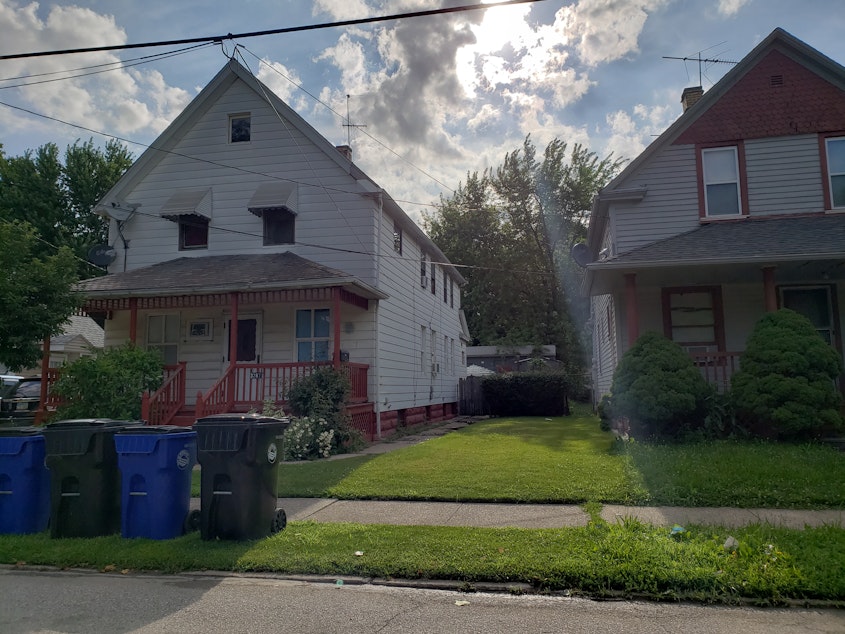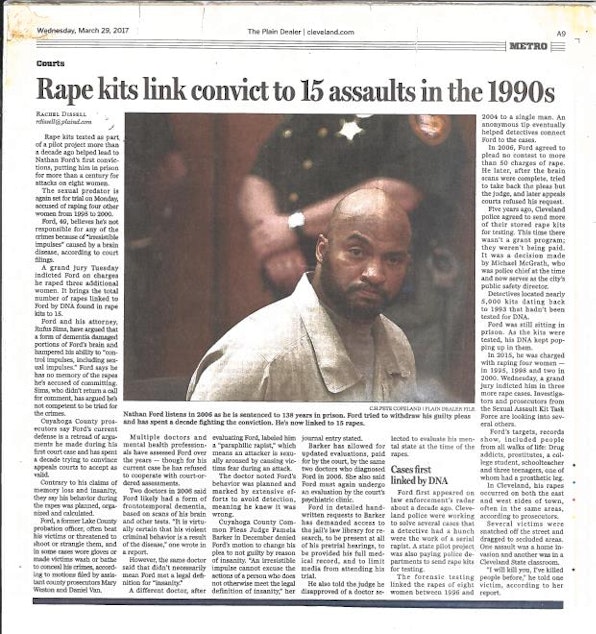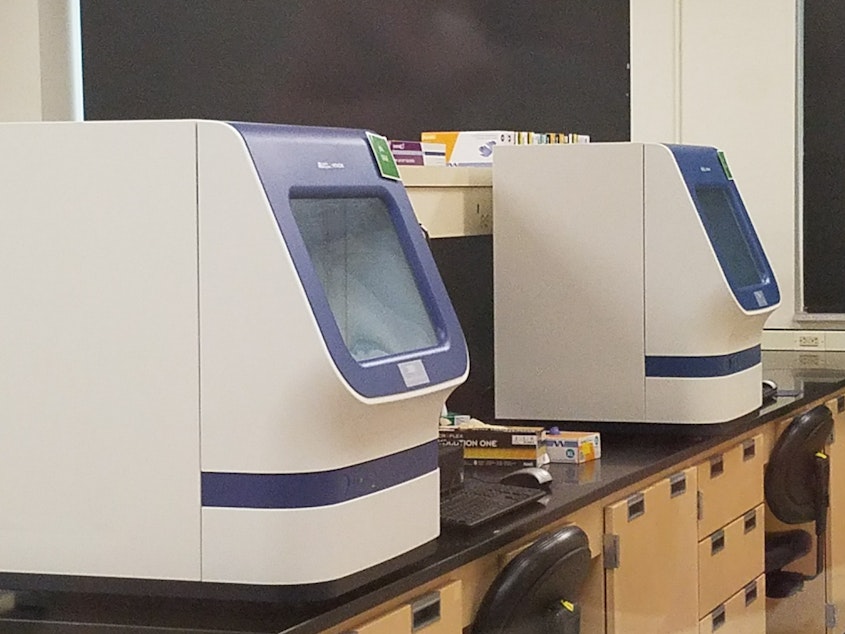Her rapist was convicted because of a rape kit. So why are so many kits untested?

Liz Garcia was at home, checking out her hair in the bathroom mirror. She saw the door open and thought it was her mom or dad who just popped by.
Then Garcia saw black shoes, black pants, black gloves, a black jacket. She kept looking up: a ski mask with two eyes leering through holes.
“The moment that I realized I had an intruder in my house, he was already in my face,” Garcia said.
Listeners asked KUOW how many rape kits are untested in Washington State. Turns out there could be 10,000 – no one knows for sure. Why is this state so far behind? Here’s how Ohio solved the same problem.
The over 6-foot intruder dragged Garcia, who is 5-foot-5, from room to room and repeatedly raped her.
“How about if I jump out the front window? How about if I jump out the side window?” Garcia said she remembers thinking. “I may get injured, but I'll live, and I won't have to face this.”
Two hours later, the intruder made her take a soapy shower – to wash away any evidence – and left the house.
That was 2004. The torture continued for over a decade.
Garcia suffered anxiety, isolation and a looming fear that he could return to attack her at any moment, she said. She slept with a knife under her pillow and tied cans to the door knob, so she could hear if someone came into the house.
Last year, Garcia faced her rapist — in court.
“I am the strong one, you are nothing but a coward.” Garcia told him to his face. “Without that mask and without those gloves, you’re weak.”
As Nathan Ford sat in a prison uniform, Garcia wasn’t afraid of him anymore, she said. He looked like a “piece of shit,” not the man that had overpowered her.
DNA testing has linked Ford to her rape and 20 others. The conviction was only possible because Ohio, where the crime took place, had committed the money, muscle, and technology to test nearly 14,000 previously untested rape kits from 2011 to 2018. That state identified 300 serial rapists, including Ford, and linked them to over 1,100 crimes.

While Ohio streamlined its testing process years ago, progress in Washington has been bogged down by bureaucracy, scarce resources, lab inefficiencies and red tape.
Washington state doesn't know how many untested rape kits remain here, though current rough estimates from the Washington State Patrol put the number between 8,000 and 10,000.
The Washington crime lab completed testing 1,600 kits from the backlog from January 2016 to the end of July 2018, not counting the number of kits involved in active investigations.
In Cleveland, Ohio, DNA testing helped Garcia emerge from the shadow of her attacker. Today, Ohio’s state crime lab turns around a sexual assault kit in around 25 days.
Rape survivors in Washington face almost five times the wait: almost four months (114 days) on average for active investigations and up to about a year and a half (539 days) for inactive investigations.
It would take at least another four to six years to eliminate the Washington’s rape kit backlog, if the Washington State Patrol continues to test the older kits at their average rate of 117 a month, according to KUOW analysis of state patrol data from January to July this year. That does not include incoming kits that are part of active investigations. Data show that the crime labs are not keeping up with new, incoming evidence.
“I can't say that I'm not satisfied, just because I think we're doing a great effort,” Jean Johnston, a lab manager at the Washington State Patrol. “There's more that could be done. But at this time with the resources that we have I think we have a good darn effort going.”

State Rep. Tina Orwall, a Democrat from South King County, said that's not enough. Orwall is co-chair of a state task force to reduce the number of untested kits in the state.
“I'm sorry the system broke down," she said. "We really failed a lot of people who had a horrible, traumatic experience.”
White boxes
A sexual assault kit is a white box, smaller than a shoebox, filled with evidence collected during a medical examination, such as clothing, hair, and Q-tip-like swabs of body fluid.
Law enforcement agencies used to have discretion over whether to send rape kits to the state crime lab for testing, depending on their value to a particular case. But in 2015, the state passed a bill, sponsored by Rep. Orwall, mandating all sexual assault kits be tested.
After that, the Washington State Patrol’s crime labs were overwhelmed by demand, DNA scientist Phil Hodge said.
“We do not at this time have the resources to process the huge increase in sexual assault kits,” Hodge said.
The solution? Outsourcing.
Send the older kits to a lab in Utah if their case is inactive and happened before July 24, 2015, and task Washington crime labs with anything newer or involved in active investigations.
But delays have hurt progress. The first kits were sent to the Utah labs run by private company, Sorenson Forensics, in January 12, 2016 – almost a year after the law was passed mandating rape kit testing.
Outsourcing doesn’t completely lighten the load of the state crime lab, as state patrol scientists still have to review the private work, lab manager Jean Johnston said.
Training and retaining enough forensic scientists is a challenge, she said. Even though the lab has received funding for three more forensic scientists, it will be years before they are hired and fully trained to test sexual assault kits.
Delays keep offenders free. Two cases recently emerged of rapists in Seattle and Tumwater who continued raping women as their DNA sat in the testing queue.
Untested kits sit on shelves across the state. Two KUOW listeners asked for the number of untested kits in Seattle.
As of 2013, 1,314 rape kits booked into evidence by the Seattle Police Department had not been processed by the state crime lab, according to a public records request by the Joyful Heart Foundation, a nonprofit focused on ending the national rape kit backlog.
KUOW requested more recent records and they show 551 kits booked into SPD evidence from 2014 to present still await testing. To get that number, staff from the department's sexual assault unit had to search through hundreds of reports and records by hand over four months.
The Washington State Attorney General is conducting an inventory of untested rape kits across the state. As of August 10, investigators counted 4,682 kits from 160 law enforcement agencies. The Seattle Police Department and 47 others hadn’t responded with its numbers as of mid-August.
We called law enforcement offices across the state to find numbers, too. As of May 2018, the police department in Federal Way had 342. Lynnwood had 28, Renton has 51, Bellevue had 74 and Spokane had 87, according to calls to the departments. The Spokane County Sheriff had 400.
When kits are tested, they yield results. So far 35 percent of the kits from the backlog that have been uploaded to the FBI’s database have yielded hits to other crimes, according to Washington State Patrol data from June.
Hack-a-thon
In the world of forensic science, Ohio is a role model.
Alison Holm, a radio reporter from Columbus, Ohio, toured the state lab for KUOW. “More than anything else, the rooms look like well-equipped high school chemistry labs, lined with windows and laid out along narrow corridors,” Holm said.

Surrounded by fields, the lab is the second tallest building around after the prison across the street.
In 2011, the Ohio Attorney General’s office pushed the state to address its backlog. In response, the Ohio Bureau of Criminal Investigation held a week-long hack-a-thon where they revamped each step in the rape kit testing process using Kaizen, a Japanese productivity philosophy, said Kristen Slaper, a DNA laboratory supervisor.
“It used to be that it could take a scientist an entire day to work a rape kit,” Slaper said. “Now it can take an hour or two for them to open it, do minimal screening, take their notes and cut the samples into tubes.”
The lab runs like an assembly line with tasks divided among scientists. Ohio trains newly hired forensic scientists in small tasks, like cutting swabs, and gets them on the job within a month, Slaper said.
They also minimize time-consuming biological tests run on body fluids – including hunting for sperm with a microscope for hours, for example.
“We're looking for body fluids less, but we're processing DNA more,” she said.
The Washington state crime lab still does these biological tests.
Ohio also invested heavily in new robotics to process dozens of samples at once and save scientists from repetitive manual tasks, such as sucking up and squeezing out drops of chemicals with pipettes.
“The robots do about three times the amount of work that an individual scientist could do,” Slaper said.
The improvements doubled the work they were able to do in five years, she said.
Washington crime lab administrators say they would need millions of dollars, more space, specially trained staff, and more equipment to process kits as quickly as Ohio. There is no concrete plan to upgrade the Washington labs to resemble Ohio’s model of efficiency.
“There's always room for improvement for everything,” Johnston said when asked if lab processes are as efficient as they could be. “But that's how science is.”
That’s not good enough for state Rep. Orwall, who is concerned about the pace of testing.
“Every one of those (untested kits) represents a survivor whose voice wasn't heard, who didn't have justice, and also potentially a very dangerous offender still on the streets,” she said.
Orwall is touring the Ohio crime labs this week along with members of our state crime lab. She’s hoping Washington state can learn from Ohio's so-called high throughput lab.
Meanwhile, the Washington State Patrol is rolling out a new online tracking system for survivors to follow their kit through testing, and is training hospitals and law enforcement how to use it.
Without Ohio’s focus on its backlog, Cleveland rape survivor Liz Garcia would still be living in fear, she said.
“If you just test those rape kits, instead of just letting them sit there, we can have answers. We can move forward,” she said. “Move on.”

